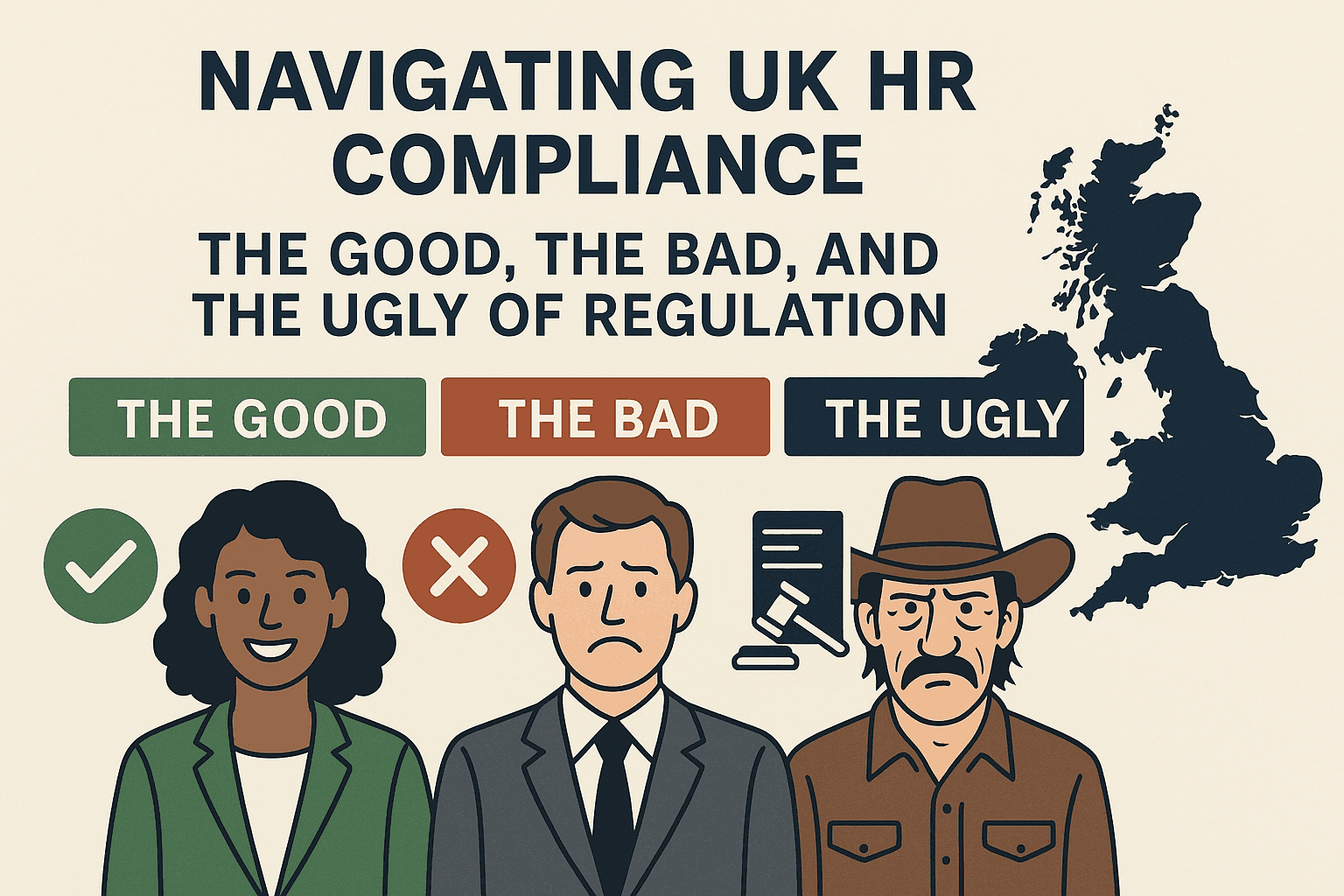Navigating UK HR Compliance: The Good, the Bad, and the Ugly of Regulation

In today’s dynamic workplace landscape, compliance with legal frameworks is a cornerstone of effective human resources management. For UK employers, navigating regulations such as the General Data Protection Regulation (GDPR), Health and Safety laws, and the Equality Act 2010 isn’t just a box-ticking exercise—it’s a strategic imperative that shapes organizational culture, protects employees, and safeguards business reputation. However, the road to compliance is fraught with challenges. Let’s explore the good, the bad, and the ugly of UK HR regulation.
The Good: Adherence to Legal Frameworks
When organizations embrace compliance as a core value, they reap long-term benefits that extend far beyond avoiding penalties.
GDPR Compliance: By ensuring data privacy and transparency in handling employee information (e.g., payroll records, P45s), companies build trust with staff and clients alike. GDPR also mandates clear consent processes for data collection, which aligns with modern expectations around digital rights.
Health and Safety Laws: Robust adherence to regulations like the Health and Safety at Work Act 1974 creates a safer workplace. From conducting regular risk assessments to providing personal protective equipment (PPE), compliance reduces accidents, absenteeism, and long-term costs tied to workplace injuries.
Equality Act 2010: This landmark legislation prohibits discrimination based on protected characteristics such as age, disability, gender reassignment, pregnancy/maternity, race, religion/belief, sex, and sexual orientation. By fostering inclusive workplaces, employers not only meet legal obligations but also attract diverse talent and drive innovation.
When compliance is embedded in HR practices, it becomes a competitive advantage—a signal of integrity, accountability, and respect for employee rights.
The Bad: Non-Compliance Risks
While the benefits of compliance are clear, the risks of neglecting UK labor laws can be costly—both financially and reputably.
Evolving Regulations: The UK’s regulatory landscape is in constant flux. For example, the National Living Wage (NLW) has risen to £10.42 per hour for workers aged 23 and over (as of April 2024). Failing to keep pace with these changes can lead to legal disputes, employee dissatisfaction, or even public backlash.
Outdated Policies: Many organizations still rely on outdated HR frameworks that don’t account for modern challenges—such as hybrid work arrangements or the gig economy—which may not fully align with current legislation (e.g., the UK’s Working Time Regulations).
Lack of Training: Employees and managers who are unaware of their legal responsibilities under GDPR or the Equality Act 2010 risk unintentional non-compliance. For instance, mishandling sensitive data or failing to accommodate reasonable adjustments for disabled employees can lead to costly mistakes.
These risks highlight the importance of continuous education and proactive policy updates to stay ahead of regulatory shifts.
The Ugly: Legal Penalties and Reputational Damage
Ignoring compliance isn’t just a moral failing—it’s a legal minefield with severe consequences.
Fines and Fines: Non-compliance can result in hefty penalties. For example, GDPR violations can lead to fines of up to €20 million or 4% of global annual revenue, depending on the severity of the breach. Similarly, failing to meet Health and Safety standards could trigger inspections from the Health and Safety Executive (HSE), with fines reaching into the millions for serious breaches.
Legal Action: Employees who face discrimination, unsafe working conditions, or data misuse may pursue legal action against employers. For instance, a claim under the Equality Act 2010 can result in compensation awards that strain organizational budgets and morale.
Reputational Fallout: In an era where social media amplifies corporate missteps, non-compliance can tarnish a company’s image. Stories of data leaks, unsafe workplaces, or discriminatory practices often go viral, deterring top talent and damaging customer trust.
The ugly truth is that these consequences are avoidable—yet they remain all too common in organizations that prioritize short-term gains over long-term compliance.
Conclusion: Compliance as a Strategic Priority
For UK HR professionals, the lesson is clear: compliance isn’t optional—it’s essential. While the good of adhering to GDPR, Health and Safety laws, and the Equality Act 2010 fosters trust, safety, and inclusivity, the bad risks of non-compliance—such as failing to meet the National Living Wage—can derail progress. And the ugly reality of legal penalties serves as a stark reminder that ignorance is no longer an excuse in today’s regulatory environment.
To thrive, organizations must treat compliance as a strategic priority. This means investing in training, staying updated on legislative changes, and embedding ethical practices into every facet of HR management. After all, the cost of non-compliance isn’t just financial—it’s human.
Are you ready to ensure your HR system is not just compliant but truly future-proof? Start by reviewing your policies today.